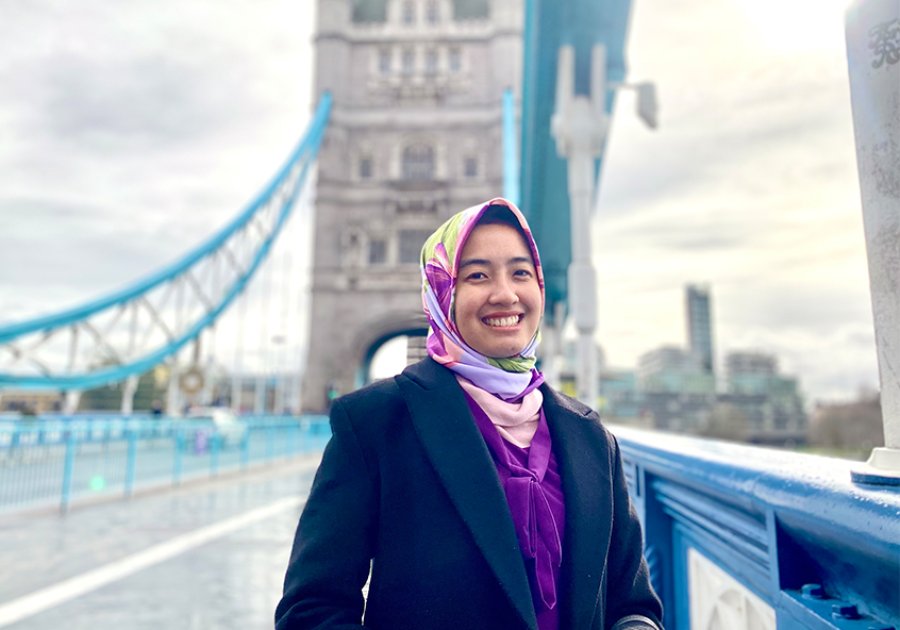Studying MSc Public Health - Gassani's story
15 May 2022 London School of Hygiene & Tropical Medicine London School of Hygiene & Tropical Medicine https://lshtm.ac.uk/themes/custom/lshtm/images/lshtm-logo-black.png
Please explain a bit about your academic/professional background.
I completed my medical degree from Universitas Indonesia in 2019, and I did an internship for a year following graduation in a primary care setting and district-level hospital in West Java, Indonesia. Afterwards, I worked as a general practitioner in the COVID-19 unit of a major teaching hospital in Indonesia (Dr Cipto Mangunkusumo Hospital) and as an intern in the Endocrinology Unit of the Indonesian Paediatric Society. After my past experience, I’m so thankful that I can pursue an MSc in Public Health at LSHTM with a fully-funded scholarship from The Indonesia Endowment Funds for Education (LPDP).
Why did you choose to study your course with LSHTM?
I decided to study at LSHTM because it’s one of the best public health schools in the UK and worldwide. I did some research on the website, reviewing its projects, school centres, student blogs, and module specifications. I found out that LSHTM has a wide range of multidisciplinary research projects and in-depth, broad modules on public health, including for low-middle income settings (e.g., health service, health economics, statistics, and epidemiology).
What have you enjoyed most about your course?
Firstly, the learning experience was filled with concise and practical materials applicable to LMICs. In LSHTM, students can choose from numerous options of modules with specific topics. I also enjoy that the learning process and assignment develop students’ critical thinking and their perspective as a researcher or policymaker. With various centres in there’s plenty of options from local to international research that we can participate in for the summer project with esteemed and global researchers. I’m so grateful that my personal tutor, programme director, research supervisor, and the school staff have been responsive and helpful with their advice and insights. Also, I made friends with students from various countries and backgrounds, including in fields other than the health sector.
I'm so grateful that my personal tutor, programme director, research supervisor, and the school staff have been responsive and helpful with their advice and insights.
What have been the best aspects of studying in the UK?
Being a student in the UK gives you the opportunity to learn from distinguished professionals and high-quality learning materials. The learning process encourages me to speak up and discuss more confidently. I received positive and specific feedback throughout the seminars and discussions, also for the assignments from the module organisers.
Beyond the academic aspect, what I like about London is its reliable public transportation system so that I can commute easily. London’s a multicultural and lively place to live with its wonderful parks, museums, and buildings. It’s also the hub of networking events, art performances, and sport. Recently, I and some students completed London Landmarks Half Marathon for the LSHTM fund; this was one of the most memorable experiences.
How did you find the mix of online and in-person teaching?
The positive side of online teaching is that we can save the commuting time for anything else. It also gives us more flexibility to hear lectures and attend seminars. On the other hand, in-person teaching makes the discussion more alive and enhances communication between students and facilitators. Both methods complement each other, and the School can facilitate online and in-person teaching of similar quality.
How will the programme help your career in the future?
I’m taking the Health Service Research stream as I’m interested in developing my knowledge and research skills to focus on the access, delivery, financing, and organisation of health services. The recommended and compulsory modules in this stream have expanded my understanding of health services from the multidisciplinary policymaker approach. The modules were very practical, concise, and doable, even though I only had a bit of experience in health service research.
LSHTM also has consultants from the career team who give career guidance to students through webinars and one-to-one sessions. The career service also includes CV and application advice, interview preparation, and access to career options.
What are your plans for after you complete your studies?
I plan to continue my clinical work and be involved in research within healthcare services back in my home country. What is more apparent is that I will also continue to learn, take courses, and explore more job opportunities after completing the study—I am still open to any possibilities.
What advice would you give to someone considering studying your course?
One of the considerations of taking this course is looking at what you will learn, and you can start exploring this by reviewing the module specifications from the course page. This will guide you on the detailed information on learning outcomes, mode of delivery, and module contents. You can also do some research about the different research centres from the website, where you can become a member or participate in their projects. Beyond what you can find on the website, you can ask and seek advice from students, alumni and staff—there are always people who are happy to help. Be curious and ready for the countless adventures that are waiting for you.
Want to find out more?
Explore MSc Public Health or Speak to Gassani to hear more about her experience.